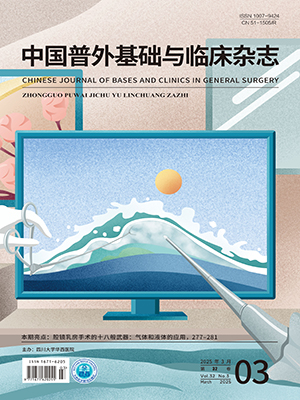| 1. |
Santiago-Schwarz F.Positive and negative regulation of the myeloid dendritic cell lineage[J].J Leukoc Biol, 1999, 66(2):209-216.
|
| 2. |
Carotta S, Dakic A, Wu L, et al.The transcription factor PU.1 controls dendritic cell development and Flt3 cytokine receptor expression in a dose-dependent manner[J].Immunity, 2010, 32(5):583-585.
|
| 3. |
Lutz MB, Suri RM, Niimi M, et al.Immature dendritic cells generated with low doses of GM-CSF in the absence of IL-4 are maturation resistant and prolong allograft survival in vivo[J].Eur J Immunol, 2000, 30(7):1813-1822.
|
| 4. |
Yang XJ, Meng S, Zhu CF, et al.Semi-mature MyD88-silenced bone marrow dendritic cells prolong the allograft survival in a rat model of intestinal transplantation[J].Chin Med J (Engl), 2011, 124(2):268-272.
|
| 5. |
杨阳, 韩岩, 杨麦贵, 等.调节性CD4+CD25+T细胞的分离纯化及免疫功能研究[J].中华实验外科杂志, 2009, 26(12):1620-1622.
|
| 6. |
Casiraghi F, Aiello S, Remuzzi G.Transplant tolerance:progress and challenges[J].J Nephrol, 2010, 23(3):263-270.
|
| 7. |
Vosters O, Nève J, De Wit D, et al.Dendritic cells exposed to nacystelyn are refractory to maturation and promote the emergenceof alloreactive regulatory T cells[J].Transplantation, 2003, 75(3):383-389.
|
| 8. |
Mahnke K, Schmitt E, Bonifaz L, et al.Immature, but not inac-tive:the tolerogenic function of immature dendritic cells[J].Immunol Cell Biol, 2002, 80(5):477-483.
|
| 9. |
Lutz MB, Schuler G.Immature, semi-mature and fully mature dendritic cells:which signals induce tolerance or immunity?[J].Trends Immunol, 2002, 23(9):445-449.
|
| 10. |
O'Connell RM, Taganov KD, Boldin MP, et al.MicroRNA-155 is induced during the macrophage inflammatory response[J].Proc Natl Acad Sci USA, 2007, 104(5):1604-1609.
|
| 11. |
Rodriguez A, Vigorito E, Clare S, et al.Requirement of Bic/microRNA-155 for normal immune function[J].Science, 2007, 316(5824):608-611.
|
| 12. |
Vigorito E, Perks KL, Abreu-Goodger C, et al.microRNA-155 regulates the generation of immunoglobulin class-switched plasma cells[J].Immunity, 2007, 27(6):847-859.
|
| 13. |
Leddin M, Perrod C, Hoogenkamp M, et al.Two distinct auto-re-gulatory loops operate at the PU.1 locus in B cells and myeloid cells[J].Blood, 2011, 117(10):2827-2838.
|
| 14. |
Leng RX, Pan HF, Qin WZ, et al.Role of microRNA-155 in autoimmunity[J].Cytokine Growth Factor Rev, 2011, 22(3):141-147.
|
| 15. |
Wu L, Liu YJ.Development of dendritic-cell lineages[J].Imm-unity, 2007, 26(6):741-750.
|
| 16. |
Bharadwaj AS, Agrawal DK.Transcription factors in the control of dendritic cell life cycle[J].Immunol Res, 2007, 37(1):79-96.
|
| 17. |
Carotta S, Dakic A, D'Amico A, et al.The transcription factor PU.1 controls dendritic cell development and Flt3 cytokine receptor expression in a dose-dependent manner[J].Immunity, 2010, 32(5):628-641.
|
| 18. |
Hamdorf M, Berger A, Schüle S, et al.PKCδ-induced PU.1 phosphorylation promotes hematopoietic stem cell differentiation to dendritic cells[J].Stem Cells, 2011, 29(2):297-306.
|
| 19. |
Thompson RC, Herscovitch M, Zhao I, et al.NF-kappaB down-regulates expression of the B-lymphoma marker C D10 through a miR-155/PU.1 pathway[J].J Biol Chem, 2011, 286(3):1675-1682.
|
| 20. |
Boks MA, Kager-Groenland JR, Haasjes MS, et al.IL-10-gener-ated tolerogenic dendritic cells are optimal for functional regulatory T cell induction-a comparative study of human clinical-applicable DC[J].Clin Immunol, 2012, 142(3):332-342.
|




